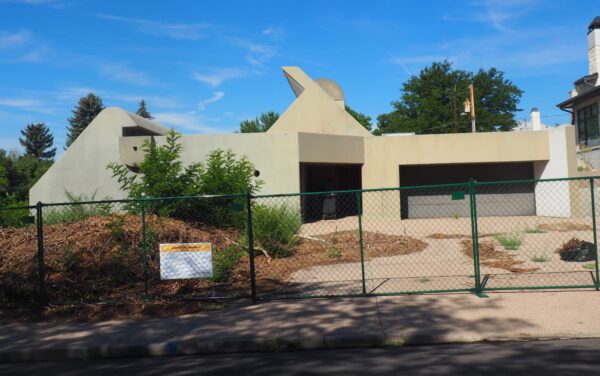
The new owner of the home at 401 N. Madison St. in Cherry Creek is a homebuilder that wants to demolish the home and construct two duplexes on the lot. (BusinessDen file photo)
The Cherry Creek home where local architect Richard Crowther lived for decades will be demolished.
The Denver City Council voted 8-2 Monday evening to reject an owner-opposed landmark designation application for the home at 401 N. Madison St.
Council members Kendra Black, Kevin Flynn, Stacie Gilmore, Chris Hinds, Paul Kashmann, Robin Kniech, Amanda Sawyer and Jamie Torres voted to reject the application. Candi CdeBaca and Debbie Ortega were the two in favor of landmark status. Three council members were absent.
The vote is a victory for MAG Builders, a Denver home builder that paid $4 million for the property in May, planning to demolish the structure and build a pair of duplexes on its 0.29-acre lot. The company can now move forward with those plans.
MAG applied to the city for a demolition permit over the summer, prompting three Denver residents — Tom Hart, Alan Gass and Michael Hughes — to file the landmark application. Designating the structure a city landmark would have effectively prevented demolition.

Richard Crowther was known for his energy-conserving architecture. (Photo courtesy of Denver Public Library/Rocky Mountain News)
Crowther, who died in 2006, designed parts of Lakeside Amusement Park, buildings for King Soopers and movie theaters for Cooper Cinerama, among other things. He designed the home for himself in the late 1970s.
Hart, Gass and Hughes argued that the home should have been preserved because of Crowther’s prominence and because it constituted an early attempt at net-zero architecture.
MAG Builders, meanwhile, said the home was in poor condition and has been vacant for 15 years, changing ownership multiple times during that period. The company said it would take another $3 million to fix up the home — and it was unclear who would even want it then.
“What’s the function of this house if it’s landmarked?” MAG Chief Financial Officer Michael Moylen told BusinessDen in October. “Who’s going to live in it? Who’s going to rent it?”
MAG had offered to sell the home to someone who would fix it up, as long as the firm didn’t lose money on the deal. But no buyer stepped forward, despite assistance from the preservation-minded nonprofit Historic Denver. (“In our opinion, this wasn’t a good faith public process,” applicant Hart said Monday.)
In the weeks leading up to the vote, more people contacted the city to say they were against landmark designation than to say they were in support. The most vocal opponents were the building’s closest neighbors.
At the Monday meeting, multiple council members expressed concern about the building’s condition, and the lack of a clear plan for renovations if it were preserved.
“If this were to be landmarked right now, we might as well pour amber over it, because it doesn’t look like there’s anything on the horizon to improve it,” Flynn said.
“What happens, if the designation is approved, if this house literally falls in on itself?” Torres asked a city staff member.
Kniech called the decision a “heartbreaker.” Black said her vote was influenced by the property’s recent past.
“Without any viable buyers wanting to preserve this property for the last 15 years, I think it would really infringe on the private property rights of these buyers,” Black said.
Kashmann acknowledged the home currently looks “less than impressive” from the street, but said he “will hate to see it go.” He said there’s value to preserving the city’s unique architecture, but doing it by approving owner-opposed applications isn’t ideal.
“If I’m thinking the city is serious about this, we have a list of 20 to 30 properties, and we have some sort of fund to acquire properties and be proactive,” Kashmann said.
Ortega said minutes before the vote that she had yet to make up her mind. CdeBaca, the only other vote in favor, didn’t comment during the meeting.
The council has only designated one individual building as a landmark against the wishes of its owner: the former Beth Eden Baptist Church at 3241 Lowell Blvd. in 2014. The council has also voted in the past to create historic districts, which include multiple structures, even when some of the affected property owners were not in favor.
There have been four other high-profile owner-opposed landmark applications since 2019, but only one of them was voted on by the council.
• In 2019, a landmark application for Tom’s Diner at 601 E. Colfax Ave. led to the property selling to an alternate buyer, who worked with diner owner Tom Messina to open a new restaurant in the existing structure.
• A 2019 application for the former Olinger Moore Howard Chapel at 4345 W. 46th Ave. also led to the property selling to an alternate buyer, who kept the chapel while building around it.
• In 2020, an application for the Carmen Court condo complex at 900 E. 1st Ave. was withdrawn because backers felt they didn’t have the necessary council support.
• In 2021, council voted unanimously to reject an application for the Denver7 building at 123 Speer Blvd.

The new owner of the home at 401 N. Madison St. in Cherry Creek is a homebuilder that wants to demolish the home and construct two duplexes on the lot. (BusinessDen file photo)
The Cherry Creek home where local architect Richard Crowther lived for decades will be demolished.
The Denver City Council voted 8-2 Monday evening to reject an owner-opposed landmark designation application for the home at 401 N. Madison St.
Council members Kendra Black, Kevin Flynn, Stacie Gilmore, Chris Hinds, Paul Kashmann, Robin Kniech, Amanda Sawyer and Jamie Torres voted to reject the application. Candi CdeBaca and Debbie Ortega were the two in favor of landmark status. Three council members were absent.
The vote is a victory for MAG Builders, a Denver home builder that paid $4 million for the property in May, planning to demolish the structure and build a pair of duplexes on its 0.29-acre lot. The company can now move forward with those plans.
MAG applied to the city for a demolition permit over the summer, prompting three Denver residents — Tom Hart, Alan Gass and Michael Hughes — to file the landmark application. Designating the structure a city landmark would have effectively prevented demolition.

Richard Crowther was known for his energy-conserving architecture. (Photo courtesy of Denver Public Library/Rocky Mountain News)
Crowther, who died in 2006, designed parts of Lakeside Amusement Park, buildings for King Soopers and movie theaters for Cooper Cinerama, among other things. He designed the home for himself in the late 1970s.
Hart, Gass and Hughes argued that the home should have been preserved because of Crowther’s prominence and because it constituted an early attempt at net-zero architecture.
MAG Builders, meanwhile, said the home was in poor condition and has been vacant for 15 years, changing ownership multiple times during that period. The company said it would take another $3 million to fix up the home — and it was unclear who would even want it then.
“What’s the function of this house if it’s landmarked?” MAG Chief Financial Officer Michael Moylen told BusinessDen in October. “Who’s going to live in it? Who’s going to rent it?”
MAG had offered to sell the home to someone who would fix it up, as long as the firm didn’t lose money on the deal. But no buyer stepped forward, despite assistance from the preservation-minded nonprofit Historic Denver. (“In our opinion, this wasn’t a good faith public process,” applicant Hart said Monday.)
In the weeks leading up to the vote, more people contacted the city to say they were against landmark designation than to say they were in support. The most vocal opponents were the building’s closest neighbors.
At the Monday meeting, multiple council members expressed concern about the building’s condition, and the lack of a clear plan for renovations if it were preserved.
“If this were to be landmarked right now, we might as well pour amber over it, because it doesn’t look like there’s anything on the horizon to improve it,” Flynn said.
“What happens, if the designation is approved, if this house literally falls in on itself?” Torres asked a city staff member.
Kniech called the decision a “heartbreaker.” Black said her vote was influenced by the property’s recent past.
“Without any viable buyers wanting to preserve this property for the last 15 years, I think it would really infringe on the private property rights of these buyers,” Black said.
Kashmann acknowledged the home currently looks “less than impressive” from the street, but said he “will hate to see it go.” He said there’s value to preserving the city’s unique architecture, but doing it by approving owner-opposed applications isn’t ideal.
“If I’m thinking the city is serious about this, we have a list of 20 to 30 properties, and we have some sort of fund to acquire properties and be proactive,” Kashmann said.
Ortega said minutes before the vote that she had yet to make up her mind. CdeBaca, the only other vote in favor, didn’t comment during the meeting.
The council has only designated one individual building as a landmark against the wishes of its owner: the former Beth Eden Baptist Church at 3241 Lowell Blvd. in 2014. The council has also voted in the past to create historic districts, which include multiple structures, even when some of the affected property owners were not in favor.
There have been four other high-profile owner-opposed landmark applications since 2019, but only one of them was voted on by the council.
• In 2019, a landmark application for Tom’s Diner at 601 E. Colfax Ave. led to the property selling to an alternate buyer, who worked with diner owner Tom Messina to open a new restaurant in the existing structure.
• A 2019 application for the former Olinger Moore Howard Chapel at 4345 W. 46th Ave. also led to the property selling to an alternate buyer, who kept the chapel while building around it.
• In 2020, an application for the Carmen Court condo complex at 900 E. 1st Ave. was withdrawn because backers felt they didn’t have the necessary council support.
• In 2021, council voted unanimously to reject an application for the Denver7 building at 123 Speer Blvd.
